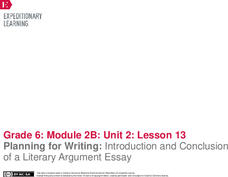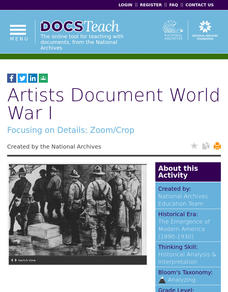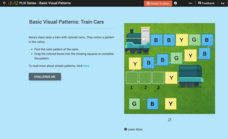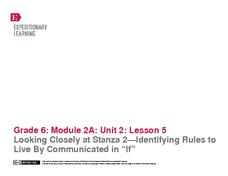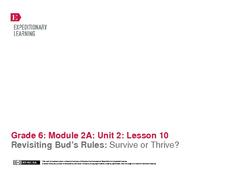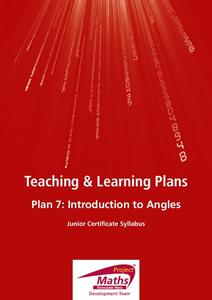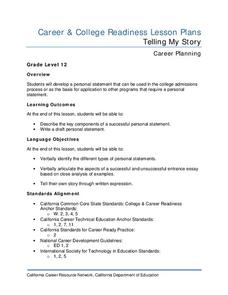EngageNY
Planning for Writing: Introduction and Conclusion of a Literary Argument Essay
Give a powerful introduction. Scholars analyze the introductory paragraph in the model essay "Are We Medieval?: Opportunities in the Middle Ages and Today." They discuss the key components the author includes and then walk through the...
DocsTeach
Artists Document World War I
Drawings may be worth even more than a thousand words. Curious scholars query an artist's rendering of troops leaving a ship after they have arrived in Europe to fight in World War I. By zooming in and looking at the entire piece, class...
University of California
Was Slavery Always Racial?
The lesson focuses on slavery in the ancient world and asks academics to decide if it was always about race. Scholars view primary sources, participate in a short discussion, and complete a worksheet to understand how slavery in the...
Penguin Books
White Fang Teacher's Notes
If you're looking for a way to structure your unit on Jack London's White Fang, use a well-organized guide to bring the intrigue of the novel to your middle school classroom. Covering a biography of the author, main background and...
Planet e-Book
David Copperfield
Don't let the length scare you away. An eBook version of David Copperfield contains all 1,307 pages of the story. This digital version of the classic coming-of-age novel follows the title character from childhood into adulthood, giving...
Judicial Learning Center
The Bill of Rights and Civil Liberties
Why is the Bill of Rights so important to American's civil liberties? An important resource helps scholars find these answers and more by reading through state and federal constitutions to discover their own civil liberties. The activity...
Orlando Shakes
To Kill a Mockingbird: Study Guide
Who was Harper Lee, and what led her to write one of the most celebrated novels of all time? Scholars learn about the author of To Kill a Mockingbird and read a summary of a dramatic production of the novel. They also discover the...
EngageNY
Grade 11 ELA Module 2: Unit 1, Lesson 5
I have an idea! Scholars examine closely how Du Bois develops a central idea in paragraph four of the chapter "Of Our Spiritual Strivings." They also begin finding significant and relevant evidence to support a topic and complete...
CK-12 Foundation
Basic Visual Patterns: Train Cars
An interactive comprised of five questions challenges young scholars to complete a simple pattern. After examining a train with colored carts, learners arrange a green, blue, and yellow block into their corresponding space. Questions are...
C-SPAN
Jane Addams and John Dewey
Imagine living where there was eight inches of garbage on the street! These were the situations the Progressive movement sought to reform. Using video clips about John Dewey and Jane Addams, learners consider the philosophies and impact...
Media Smarts
Scripting a Crime Drama
Develop novice script-writers. Small groups sift through a sample script, noting any script-writing conventions to share with the whole class. Using these conventions and plot structures, these groups compose a script for a 10-minute...
EngageNY
Looking Closely at Stanza 2—Identifying Rules to Live By Communicated in “If”
Pupils take part in a close reading of the poem, If by Rudyard Kipling, in which they delve deep into its meaning and identify its rules to live by. As the grand discussion progresses, learners then relate the poem's rules with those...
EngageNY
Revisiting Bud’s Rules: Survive or Thrive?
Bud followed a series of rules from Bud, Not Buddy by Christopher Paul Curtis. The question is, how did he use those rules to thrive or survive? After a grand discussion, class members explore the novel to locate and cite textual...
Wind Wise Education
Understanding Forms and Sources of Energy
What is the difference between a form of energy and a source of energy? This first activity in a series of 19 lessons uses demonstrations and discussions to introduce energy to the class. Through using hand-generator flashlights,...
Teaching Tolerance
Changing Demographics: What Can We Do to Promote Respect?
America has always been seen as a melting pot to the world. Scholars research the concept of blending cultures in the United States and how it is changing over time. The final lesson of a four-part series analyzes the changing...
K20 LEARN
Periodic Shuffle: Introduction to Periodicity and Electron Configuration
No matter how you shuffle the elements, their electron configurations keep them in the same order. How can that be? Introduce the concept of periodicity through a lesson that combines inquiry, discussion, and comparison. Partners...
Howard Hughes Medical Institute
Measuring Biodiversity in Gorongosa
Take your biology class' understanding of biodiversity to a whole new level! Ecology scholars use data to calculate three different diversity indices based on the organisms in the Gorongosa National Park. The four-part activity uses an...
PBS
NOVA Cybersecurity Lab Lesson Plan
Don't be fooled by cyber scams! An informative lesson teaches techies about cybersecurity. They watch videos, play a game, and engage in discussion to improve their understanding of online safety.
Project Maths
Introduction to Angles
Approach the instructional activity from the right angle. A discussion-based instructional activity leads helps learners understand angles in terms of rotation. Individuals use manipulatives to explore the properties of angles and learn...
California Department of Education
Telling My Story
Entrance essays are the ultimate sales pitch! Show your seniors how to market themselves in the first of six college and career readiness lesson plans. Pupils discover the do's and don'ts of writing personal statements through research,...
WE Charity
High School–Module 2: Circular Economy and Nature
Everyone's heard the popular slogan reduce, reuse, recycle, but there may be a better way to talk about sustainability. Using the second lesson from the five-part WE Are Innovators—High School Modules series, learners explore issues...
Howard Hughes Medical Institute
Calculating Iridium Fallout from an Asteroid Impact
Should we be afraid of a large asteroid impact on Earth today? Young scientists estimate the size and composition of an asteroid similar to the one that caused the K-T mass extinction. They apply algebraic formulas to answer questions...
Creative Visions Foundation
Video Interpretations of the UDHR
How can people better understand their rights? Scholars explore the question with the second of four installments in the Introduction to the Universal Declaration of Human Rights lesson plan series. Learners watch and write descriptions...
WE Charity
Elementary–Module 3: Food Waste
Before pupils discard anymore of their uneaten vegetables, they may want to learn more about food waste. Here's a resource to help them do just that! Using discussion and video, scholars discover how innovators are tackling the issue. As...


